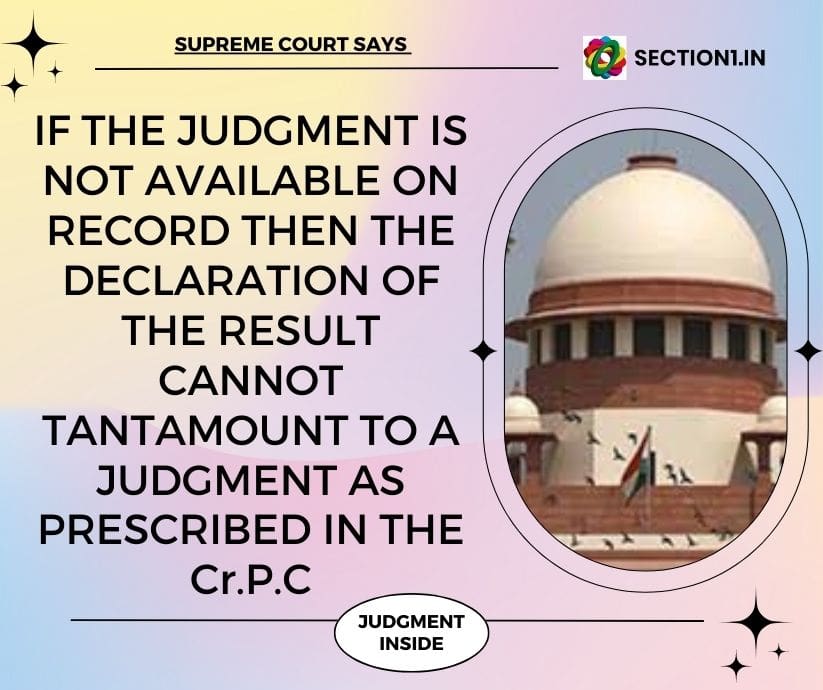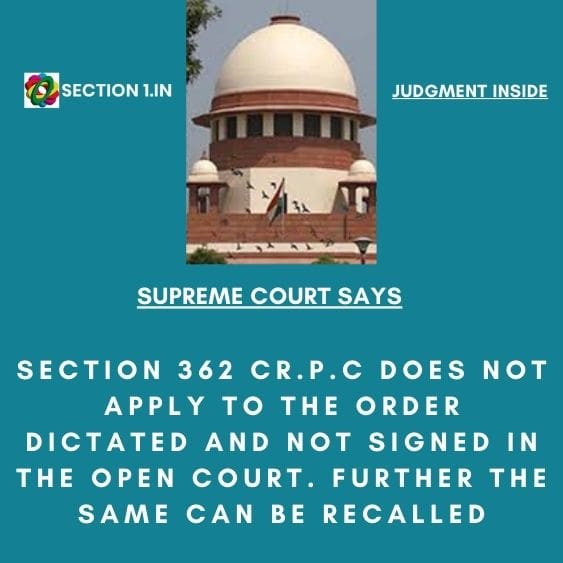FACTS IN NUTSHELL
3. That the dead body of one Kripa Shankar Shukla alias Bajrang Shukla was found lying in the well of one Chandramani Pandey on 28.10.1995 at 10:00 a.m; that an application was moved at the police station Bansdeeh, District Ballia; that the police party prepared the inquest report on 15.11.1995, however, there was no proper investigation carried out by the police officer of police station Bansdeeh, District Ballia; that some villagers sent the application to his Excellency the Governor for impartial investigation of the case; that on 13.12.1995, the appellant herein – Shakuntala Shukla (wife of the deceased) moved an application before his Excellency the President of India with the facts that she is a widow of Kripa Shankar Shukla (deceased) and her husband was murdered in the night of 26.10.1995 when he was coming back from Bansdeeh to his village Adar and thereafter the dead body was thrown in the well to create confusion; that on the said application of the appellant herein, Special Secretary, Ministry of Home Affairs, Government of Uttar Pradesh, Lucknow directed for investigation of the matter by CB-CID; that during the investigation, the names of the private respondents herein – accused came into light; that CB-CID submitted the chargesheet against the accused Swaminath Yadav and others co-accused under Sections 147, 149, 302, 201, 218, 120B IPC; that the learned trial Court framed the charge under Sections 302/149, 201, 120-B IPC.
xxx
4.2 Order dated 08.10.2018 passed by the High Court in Criminal Miscellaneous Bail Application No. 1A/1 of 2018 in Criminal Appeal No. 1283/2018 in the case of accused – Swaminath Yadav has been followed in other three appeals and other three accused, namely, Surendra Kumar Pandey, Jhingur Bhar and Vikrama Yadav are also released on bail on parity and on the ground that co-accused Swaminath Yadav has been released on bail by a coordinate Bench.
5. Feeling aggrieved and dissatisfied with the impugned orders passed by the High Court releasing the accused on bail pending respective criminal appeals, the appellant – victim – wife of the deceased has preferred the present criminal appeals.
xxx
WHAT IS JUDGMENT?
9.2 First of all, let us consider what is “judgment”. “Judgment” means a judicial opinion which tells the story of the case; what the case is about; how the court is resolving the case and why. “Judgment” is defined as any decision given by a court on a question or questions or issue between the parties to a proceeding properly before court. It is also defined as the decision or the sentence of a court in a legal proceeding along with the reasoning of a judge which leads him to his
decision. The term “judgment” is loosely used as judicial opinion or decision. Roslyn Atkinson, J., Supreme Court of Queensland, in her speech once stated that there are four purposes for any judgment that is written:
i) to spell out judges own thoughts;
ii) to explain your decision to the parties;
iii) to communicate the reasons for the decision to the public; and
iv) to provide reasons for an appeal court to consider
ELEMENTS OF JUDGMENT
9.3 It is not adequate that a decision is accurate, it must also be reasonable, logical and easily comprehensible. The judicial opinion is to be written in such a way that it elucidates in a convincing manner and proves the fact that the verdict is righteous and judicious. What the court says, and how it says it, is equally important as what the court decides.
Every judgment contains four basic elements and they are (i)statement of material (relevant) facts, (ii) legal issues or questions, (iii)deliberation to reach at decision and (iv) the ratio or conclusive decision. A judgment should be coherent, systematic and logically organised. It should enable the reader to trace the fact to a logical conclusion on the basis of legal principles. It is pertinent to examine the important elements in a judgment in order to fully understand the art of reading a judgment. In the Path of Law, Holmes J. has stressed the insentient factors that persuade a judge. A judgment has to formulate findings of fact, it has to decide what the relevant principles of law are, and it has to apply those legal principles to the facts. The important elements of a judgment are:
i) Caption
ii) Case number and citation
iii) Facts
iv) Issues
v) Summary of arguments by both the parties
vi) Application of law
vii) Final conclusive verdict.
WRITING JUDGMENT IS AN ART
9.4 The judgment replicates the individuality of the judge and therefore it is indispensable that it should be written with care and caution. The reasoning in the judgment should be intelligible and logical. Clarity and precision should be the goal. All conclusions should be supported by reasons duly recorded. The findings and directions should be precise and specific. Writing judgments is an art, though it involves skilful application of law and logic. We are conscious of the fact that the judges may be overburdened with the pending cases and the arrears, but at the same time, quality can never be sacrificed for quantity. Unless judgment is not in a precise manner, it would not have a sweeping impact. There are some judgments that eventually get overruled because of lack of clarity. Therefore, whenever a judgment is written, it should have clarity on facts; on submissions made on behalf of the rival parties; discussion on law points and thereafter reasoning and thereafter the ultimate conclusion and the findings and thereafter the operative portion of the order. There must be a clarity on the final relief granted. A party to the litigation must know what actually he has got by way of final relief. The aforesaid aspects are to be borne in mind while writing the judgment, which would reduce the burden of the appellate court too. We have come across many judgments which lack clarity on facts, reasoning and the findings and many a times it is very difficult to appreciate what the learned judge wants to convey through the judgment and because of that, matters are required to be remanded for fresh consideration. Therefore, it is desirable that the judgment should have a clarity, both on facts and law and on submissions, findings, reasonings and the ultimate relief granted.
PARTY: Shakuntala Shukla vs. State of Uttar Pradesh and Another – CRIMINAL APPEAL NO. 876 OF 2021 – September 07, 2021.
https://main.sci.gov.in/supremecourt/2019/928/928_2019_13_1501_29807_Judgement_07-Sep-2021.pdf






